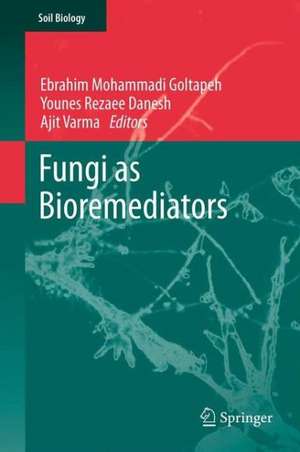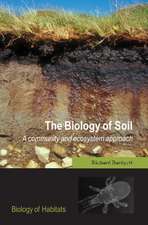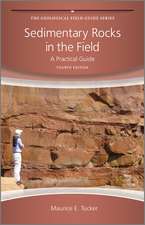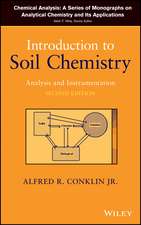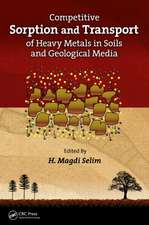Fungi as Bioremediators: Soil Biology, cartea 32
Editat de Ebrahim Mohammadi Goltapeh, Younes Rezaee Danesh, Ajit Varmaen Limba Engleză Hardback – 6 feb 2013
This volume of Soil Biology discusses the potentials of filamentous fungi in bioremediation. Fungi suitable for degradation, as well as genetically modified organisms, their biochemistry, enzymology, and practical applications are described. Chapters include topics such as pesticide removal, fungal wood decay processes, remediation of soils contaminated with heavy and radioactive metals, of paper and cardboard industrial wastes, and of petroleum pollutants.
| Toate formatele și edițiile | Preț | Express |
|---|---|---|
| Paperback (1) | 1226.60 lei 6-8 săpt. | |
| Springer Berlin, Heidelberg – 7 mar 2015 | 1226.60 lei 6-8 săpt. | |
| Hardback (1) | 1231.47 lei 6-8 săpt. | |
| Springer Berlin, Heidelberg – 6 feb 2013 | 1231.47 lei 6-8 săpt. |
Din seria Soil Biology
- 18%
 Preț: 958.56 lei
Preț: 958.56 lei - 18%
 Preț: 1225.62 lei
Preț: 1225.62 lei - 18%
 Preț: 957.75 lei
Preț: 957.75 lei - 18%
 Preț: 1232.09 lei
Preț: 1232.09 lei - 18%
 Preț: 949.90 lei
Preț: 949.90 lei - 18%
 Preț: 1392.95 lei
Preț: 1392.95 lei - 18%
 Preț: 952.26 lei
Preț: 952.26 lei - 18%
 Preț: 1231.32 lei
Preț: 1231.32 lei - 18%
 Preț: 956.03 lei
Preț: 956.03 lei - 18%
 Preț: 948.29 lei
Preț: 948.29 lei - 18%
 Preț: 1224.18 lei
Preț: 1224.18 lei - 18%
 Preț: 1226.90 lei
Preț: 1226.90 lei - 18%
 Preț: 952.26 lei
Preț: 952.26 lei - 18%
 Preț: 942.63 lei
Preț: 942.63 lei - 18%
 Preț: 946.55 lei
Preț: 946.55 lei - 18%
 Preț: 1221.20 lei
Preț: 1221.20 lei - 18%
 Preț: 1225.94 lei
Preț: 1225.94 lei - 18%
 Preț: 946.24 lei
Preț: 946.24 lei - 24%
 Preț: 1051.29 lei
Preț: 1051.29 lei - 18%
 Preț: 1221.02 lei
Preț: 1221.02 lei - 18%
 Preț: 947.98 lei
Preț: 947.98 lei - 18%
 Preț: 948.47 lei
Preț: 948.47 lei - 18%
 Preț: 1222.31 lei
Preț: 1222.31 lei - 18%
 Preț: 1231.64 lei
Preț: 1231.64 lei - 18%
 Preț: 1225.31 lei
Preț: 1225.31 lei - 18%
 Preț: 1229.73 lei
Preț: 1229.73 lei
Preț: 1231.47 lei
Preț vechi: 1501.79 lei
-18% Nou
Puncte Express: 1847
Preț estimativ în valută:
235.72€ • 256.13$ • 198.13£
235.72€ • 256.13$ • 198.13£
Carte tipărită la comandă
Livrare economică 21 aprilie-05 mai
Preluare comenzi: 021 569.72.76
Specificații
ISBN-13: 9783642338106
ISBN-10: 3642338100
Pagini: 489
Ilustrații: XI, 489 p. 23 illus., 3 illus. in color.
Dimensiuni: 155 x 235 x 35 mm
Greutate: 0.84 kg
Ediția:2013
Editura: Springer Berlin, Heidelberg
Colecția Springer
Seria Soil Biology
Locul publicării:Berlin, Heidelberg, Germany
ISBN-10: 3642338100
Pagini: 489
Ilustrații: XI, 489 p. 23 illus., 3 illus. in color.
Dimensiuni: 155 x 235 x 35 mm
Greutate: 0.84 kg
Ediția:2013
Editura: Springer Berlin, Heidelberg
Colecția Springer
Seria Soil Biology
Locul publicării:Berlin, Heidelberg, Germany
Public țintă
ResearchCuprins
Ecophysiology of Fungal Bioremediation.- Application of Mycoremediation Against Organic Pollutants.- Mycoremediation of Inorganic Pollutants.- Mycoremediation: Agricultural and Forest Ecosystem Sustainability.- Techniques in Mycoremediation.
Recenzii
From the book reviews:
“This book is useful to a wide range of clientele including scientist, genetic engineers, waste site managers and any expert in allied fields. This book is suitable for graduate and undergraduate students dealing with the fungal bioremediations. Hopefully this information will stimulate research in greater and wider scope in microremediation process in the coming times. Should be available in all research laboratories dealing with mycology, community and university libraries.” (Anupama Daranagamaand Kevin D. Hyde, Fungal Diversity, December, 2014)
“This book is useful to a wide range of clientele including scientist, genetic engineers, waste site managers and any expert in allied fields. This book is suitable for graduate and undergraduate students dealing with the fungal bioremediations. Hopefully this information will stimulate research in greater and wider scope in microremediation process in the coming times. Should be available in all research laboratories dealing with mycology, community and university libraries.” (Anupama Daranagamaand Kevin D. Hyde, Fungal Diversity, December, 2014)
Textul de pe ultima copertă
Biological remediation methods have been successfully used to treat polluted soils. While bacteria have produced good results in bioremediation for quite some time now, the use of fungi to decontaminate soils has only recently been established.
This volume of Soil Biology discusses the potentials of filamentous fungi in bioremediation. Fungi suitable for degradation, as well as genetically modified organisms, their biochemistry, enzymology, and practical applications are described. Chapters include topics such as pesticide removal, fungal wood decay processes, remediation of soils contaminated with heavy and radioactive metals, of paper and cardboard industrial wastes, and of petroleum pollutants.
This volume of Soil Biology discusses the potentials of filamentous fungi in bioremediation. Fungi suitable for degradation, as well as genetically modified organisms, their biochemistry, enzymology, and practical applications are described. Chapters include topics such as pesticide removal, fungal wood decay processes, remediation of soils contaminated with heavy and radioactive metals, of paper and cardboard industrial wastes, and of petroleum pollutants.
Caracteristici
Contributions by leading international authorities in their fields Chapters represent pioneer work and the most complete synthesis myco-remeditation Provides new frontiers for future research Includes supplementary material: sn.pub/extras
